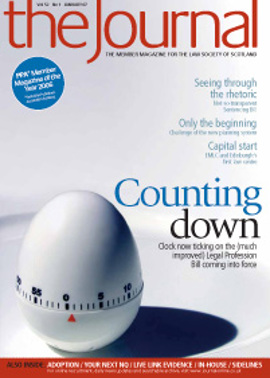Status of the expert's report

Recovery of documents
A number of issues arose in the recent decision of Lord Carloway in Whitehead’s Legal Representative v Douglas [2006] CSOH 178; 2006 GWD 37-737. In a reparation claim the pursuer had lodged two reports. The accident reconstruction report from an English specialist and a psychologist’s report both referred to precognitions which had been forwarded to the authors of the reports to enable them to prepare their reports. The defenders sought to recover these documents referred to in the reports. The basis for the application was, first, that it was the duty of an expert to disclose all sources of information to enable the opinion reached to be tested. Secondly, by revealing part of the content of the documents in the reports, any privilege had been waived. Finally, any precognitions which had been used by the experts for the purpose of preparing the report could be put to the expert to test the conclusion reached in a report.
Before dealing with these points Lord Carloway made an observation relating to documents which are founded on and those which are simply used at proof. The reports fell into the latter category and there was no obligation to lodge them in terms of any rule of court relating to documents founded on in the pleadings. Documents which fall into the former category and which have to be produced in terms of such a rule, namely RCS, rule 27.1(1) or OCR 21.1, are documents upon which an action is based and are founded on in the averments by incorporation or quotation, for instance a contractual document. Whilst the evidence of experts may be crucial, their reports do not fall within that former category. Indeed they may not even require to be lodged as productions, although to do so may be of assistance to the expert and gives the other side notice.
Lord Carloway observes that no mention, quite correctly, is made of the reports in the pleadings. Pleaders in the sheriff court please note. I do not know how often I see medical reports in such actions incorrectly being incorporated brevitatis causa in pleadings! His Lordship indicated that the report itself was not evidence and there was no absolute right to the material which might have been used to reach the opinion in the report. If the report disclosed certain real evidence then such evidence might be recoverable. Likewise if it disclosed other witnesses, they could be precognosced. His Lordship observed that there was no obligation on an expert to disclose the sources of his information upon which his opinion was based. The fact that parts of the documents provided to the expert had been set out in the reports did not amount to waiver. The documents produced to the expert might simply have been listed in the report. Testing an expert’s opinion in court was properly carried out in a number of ways, such as undermining the basis upon which the opinion was founded.
Interim interdict
A recent decision from Sheriff Principal Lockhart in Duff v Kiel 2006 GWD 39-759 reiterates the prerequisites for such an order. The pursuers had been granted interim interdict against the defenders from demolishing certain buildings. The defenders had been granted permission from the appropriate authority to demolish the buildings. The sheriff principal reiterated that before such an order could be made there required to be a prima facie case. This involved a wrong being committed or apprehended and a right, title, and interest to sue vesting in the pursuer. The fact that the defenders had planning permission indicated that no wrong was being committed. The pursuers further had no title etc to sue. There was no legal relation between the parties which was being infringed. It is only after a prima facie case was made out that the balance of convenience entered the equation.
Actions of ejection
In an action of ejection against a squatter it is not necessary for the pursuer to be infeft. This was the decision reached by Sheriff Principal Taylor in Blackburn v Cowie, Glasgow Sheriff Court, 24 May 2006. Sheriff Principal Taylor further decided that if a permanent trustee was successful in persuading a court to dispense with the bankrupt’s spouse’s consent to the sale of the family home, then in the event of the spouse failing to vacate the property, in any resultant action of ejection the court has regard to exactly the same considerations which applied when the consent was dispensed with.
Antisocial behaviour orders
In Aberdeen City Council v Fergus 2006 GWD 36-727 Sheriff Principal Young confirmed that in considering whether an interim order should be made, the court undertook a two stage test. The court requires to be satisfied, first, that the person was engaged in antisocial behaviour, and secondly, that an interim order should be made. In looking at this matter, no particular standard of proof is applicable. The second stage requires the sheriff to consider all relevant matters, ignore irrelevant matters, correctly apply the law and come to a decision which is reasonable.
Summary causes
An interesting point arose in Dale v Lets Glasgow Ltd, Glasgow Sheriff Court, 24 November 2006. The statement of claim did not disclose a legal basis of claim and was accordingly irrelevant. The defenders prior to the calling had intimated a defence to the action. At the calling in terms of summary cause rule 8.2 the sheriff was advised that settlement had almost been achieved and accordingly the parties were allowed a short time to agree a figure. After the short adjournment the parties intimated that settlement had been agreed at a specific figure. The case was continued for settlement to be implemented. Settlement was not achieved and indeed there was a subsequent denial that settlement had been agreed. A proof was assigned. At the proof diet the sheriff who had presided when settlement was agreed, was assigned to hear the proof. The sheriff recalled the case and granted decree in light of the settlement having been previously agreed. The defenders appealed to Sheriff Principal Taylor. One observation made by the sheriff principal was that if there was a dispute as to whether settlement had been agreed, then rather than a proof being fixed a minute should have been lodged setting out the basis for the claim that there had been a settlement, with answers being lodged.
It was argued by the defenders that as the statement of claim was irrelevant, any agreement to settle was based on error. Accordingly any such settlement could not be given effect to by the court. The sheriff, in granting decree, had however done this. Sheriff Principal Taylor refused the appeal. The parties had reached an extrajudicial settlement and had intimated that to the court. They were bound by that. The fact that the summons had been irrelevant was of no consequence.
The sheriff principal made the observation that as the parties had intimated at the first calling that settlement was close, and after a brief adjournment had intimated that settlement had been agreed, there had been no obligation on the sheriff to undertake the duties imposed in terms of rule 8.3(2). I think, from a practical point of view, that is correct. If when a summary cause/small claim first calls, the parties indicate that settlement may be achieved, it is unlikely that a sheriff will look at the statement of claim to ascertain its legal soundness! I would simply observe, what happened at the continued calling? Should not the sheriff then have undertaken the duties in terms of rule 8.3(2)? If that had occurred, would the summons not have been dismissed in terms of rule 8.3(3)(c)? That perhaps is the sermon of perfection, one of the problems with the proper operation of rule 8.3(2) being simply that the time potentially required to do the job properly is normally not available!
Expenses
In Hodge v Hodge, Lanark Sheriff Court, 28 November 2006, Sheriff Principal Lockhart considered that an award of expenses against the pursuer in respect of a divorce proof was justified having regard to the reasonableness of the parties’ claims, the extent of cooperation and disclosure by the parties and subsequent agreement, the offers made, the extent to which a proof could have been avoided, and the final outcome.
The usual caveat applies. Belated best wishes for 2007.
In this issue
- The Isle of Man
- Contractual handcuffs: enhanced redundancy rights
- Strength of purpose
- Cleared for take-off
- Countdown phase
- A quiet revolution
- Acting your age
- Adopting new solutions
- Clear as mud?
- Majoring in minorities
- Believe in the future
- Appreciation: Dr J Stuart Fair
- Grow your own assistant
- On the radar
- Status of the expert's report
- Rewarding experience
- Restructuring - in hindsight
- Court rules catch up with live link TV
- Scottish Solicitors' Discipline Tribunal
- Website reviews
- Book reviews
- Top notch training
- A clearer way to deal
- Not the best option
- Letting in the disabled
- Single survey: have your say






